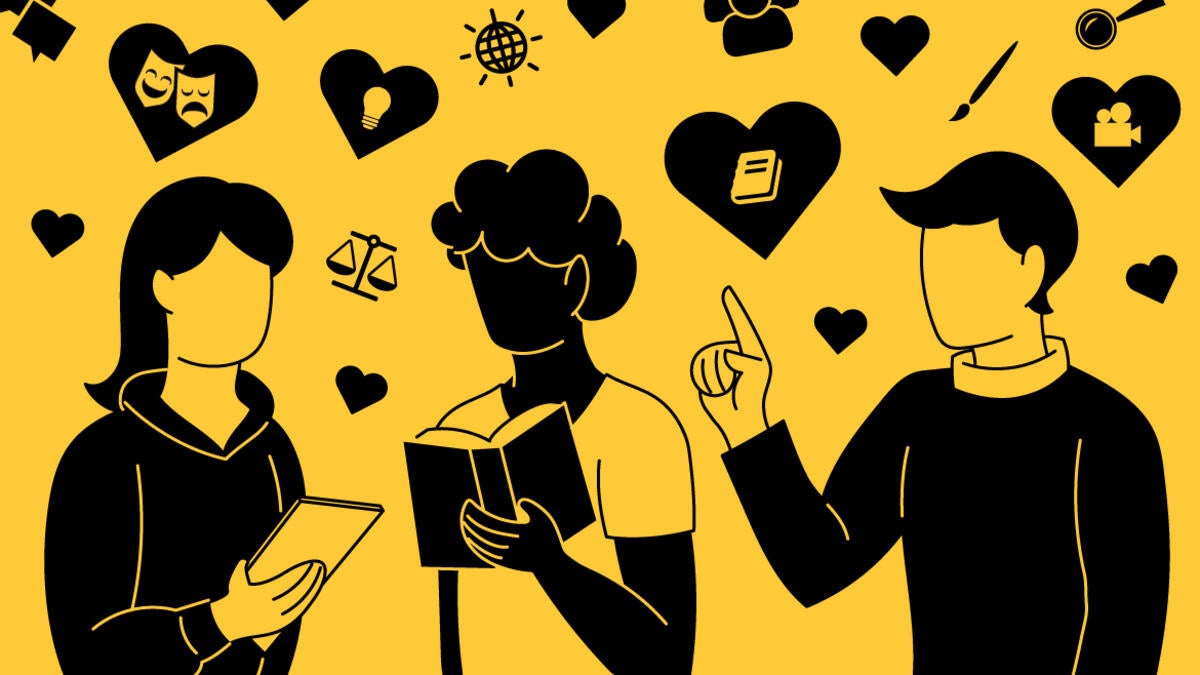The humanities encompass everything from history, literature and creative writing to film and media, language and culture, philosophy, linguistics and religion. Some who pursue a degree or a career in the humanities know it is their passion early in their academic journey, while others discover their passion later on.
“The humanities invite those who study them to a life of adventure: They prepare you to face the world with openness, empathy, curiosity and joy,” said Jeffrey Cohen, dean of humanities in The College of Liberal Arts and Sciences at Arizona State University. “I went to college on a science scholarship and thought I was going to major in biology, but I found more fulfillment in studying life through language, literature, history and philosophy.
“The first English class I took opened with Zora Neale Hurston’s ‘Their Eyes Were Watching God’ and I was stunned by the power of that book to narrate beautiful endurance in the face of catastrophes like hurricanes and environmental racism.
“Hurston’s love of words made me want to study language more deeply, and so I took courses in Old English and Middle English and Latin and Greek and French. Hurston also made me realize that story is essential to understanding ecology and the environment — and to creating communities that remember and care. I’ve spent my life studying the humanities and continuing to learn; the humanities incline you toward being a perpetual student, ensuring that your horizons will grow and your adventures multiply.”
Twelve faculty, alumni and students from The College’s humanities division shared their stories of what made them fall in love with the study of human culture.
MORE: Explore the humanities at ASU
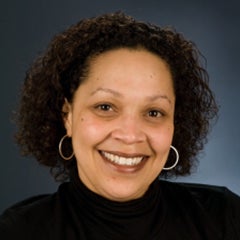
Leslie Alexander
Associate professor, School of Historical, Philosophical and Religious Studies
“Although it happened nearly 30 years ago, I can still remember the exact moment that I came to love the humanities. The moment I understood its true power and purpose. I can see it in my mind’s eye as if it was yesterday. The way the sun was shining through the classroom window on a warm spring day in California. The tremor in my professor’s voice as she passionately delivered a lecture. Or, more accurately, as she told us a story — the story of the trans-Atlantic trade in humans. The heart-wrenching tale of millions of Africans sold into bondage and dragged across the ocean in shackles, doomed to live out lives of unrelenting labor under the cruel and unforgiving lash. As her story reached a crescendo, I felt chills throughout my body as I imagined the horrors that generations of people had endured. Then I felt anger, not only at the historical events, but at the painful reality that I reached the age of 19 and no one had ever told me this story. That I was an adult, and I didn’t know the true story of how my people came to be in this country. … Fortunately, my rage quickly turned into determination. At that moment, I understood the value of education and the humanities in a way that I never fully appreciated before. I realized why the story of humanity — our struggles, our triumphs, our joys and our deepest sorrows — is so vital.”
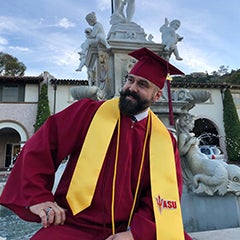
Alfonso Alvarez
Bachelor’s degree in Spanish, Class of 2020
“Without knowing it, I've always loved humanities because I was fortunate enough to have a father who instilled the Spanish language, literature and Hispanic culture in general in our household.
However, it was upon researching the characteristics of the golden age of Spanish literature that I absolutely fell in love and felt at home.
Upon changing my major from history to Spanish, I took my first Spanish class, and knew I was where I belonged.”
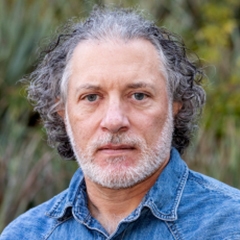
Ronald Broglio
Professor, Department of English
“When I was a teenager I was looking for answers to difficult questions in a world I didn’t understand. My father was a mechanical engineer, and I spent a lot of my teen years wanting to be like him. My best classes in high school were calculus and physics. I studied astronomy and learned programming. But at this same time my parents got divorced … I lost faith in the sciences. They did not seem to have answers to the new world I encountered — why people love each other, hurt each other, betray each other, and how to live in a troubled moral universe. In my senior year of high school we read Joseph Conrad’s ‘Heart of Darkness’ and Thomas Hardy’s ‘Jude the Obscure,’ which captured for me the complex picture of societies. So, I studied literature as a way to get a look into why humans do what they do and why societies fall short of their ideals. … My first year of college, English was my worst subject. I had plenty of ideas and things I wanted to say, but I had to take extra classes to learn how to write a coherent essay. It was a persistent desire to respond to a complicated world that kept me studying and honing my writing. Questions about human nature and how societies function are, of course, never answered. They are open-ended questions. But in trying to answer them and answering time and time again, the humanities gives us a window into the world in troubled times.”
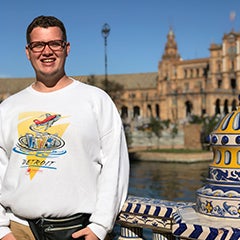
Max Courval
Bachelor’s degree in geography with minors in Spanish and urban planning, Class of 2020
“I realized I fell in love with the humanities after my first course with Dr. David Foster. The course was called Globalized Brazil through Film. As a geography major, I had learned about globalization through the lens of geography as a social science, and the ensuing phenomena of migration, development, etc. In this course I continued to not only learn about globalization, but I examined it critically through a specific medium, film, and a specific country, Brazil. This was my 'aha' moment, as I realized I could synthesize my interests in both humanities and social sciences to create my own interdisciplinary path.”
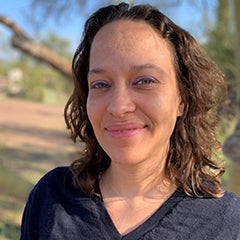
Aviva Dove-Viebahn
Assistant professor, Department of English
“Despite coming from a family of writers, I grew up intending to become a scientist — perhaps following in my chemist grandfather’s footsteps or pursuing a burgeoning teen love of genetics. But then I went to a liberal arts college, one that not only encouraged us to explore divergent academic interests, but also mandated a certain degree of diversity in its required courses. I was lucky that my course work allowed me the flexibility to double major in biochemistry and theater, and for a while I was content to spend my days in the lab and my nights hanging lights, running lines or staffing the box office in our college’s little black box theater. My junior year, I took an art history class in order to fulfill one last subject area requirement for my degree. The professor’s passion for the material and her interpretative precision struck a nerve for me. I was blown away, and I spent my last year and half on campus taking every art history course I could fit into my schedule. While I enjoyed much of what I was learning and doing in both my majors, I had never loved something as much as I loved learning and writing about art — exploring how we look and interpret the things we see, how artists represent the world around them, how the form a representation takes can inform the viewer’s reception of its content."
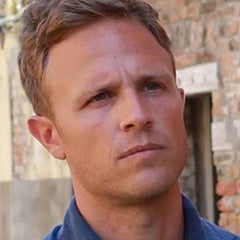
Chris Livesay
Bachelor’s degrees in art history and Italian, Class of 2005
“I was always a good student, but reluctant to try harder than I needed to. Then I discovered art history. All of a sudden, I was staying up late to read about the avant-garde, Diocletian's Palace and minimalism. Not to cram for a test, but because I couldn't imagine my life without the adventure. Before long I'd wandered my way into an Italian 101 class at ASU, and I was equally incantato (enchanted). The same year I was studying Dante, and a year later reading ‘The Leopard’ by Giuseppe Tomasi di Lampedusa. I'll never forget the feeling of satisfaction to read such an important novel in its original language, and to actually understand it deeply.”
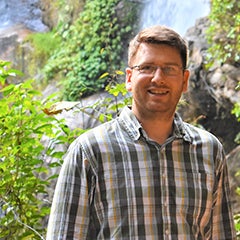
John Ransone
Senior majoring in Asia studies (Southeast Asia)
“I had gone to a small Midwestern high school that in no way prepared me for college or the world at large. I stumbled through several years of thinking I was going to be a math teacher, simply because I am good at math. Failing grades nearly landed me on the academically expelled list before I made the decision to drop out. I eventually joined the Army and was stationed in Hawaii. My work there was incredibly rewarding and educational as I worked on projects focused on humanitarian assistance and natural disaster response. As a result, I fell in love with the people, cultures, languages and history of Southeast Asia. I was fortunate to make numerous trips to Southeast Asia, where my experiences ignited a passion in me to put people first and do what I could to help others. … I made the decision to leave the Army and repursue an education. I was drawn to ASU by my encounters with faculty and staff during a campus visit … however, it was an impromptu conversation with David Brokaw in a parking garage at the end of a long day that cemented the decision and underscored how much the faculty at ASU is invested in the success of the students.”
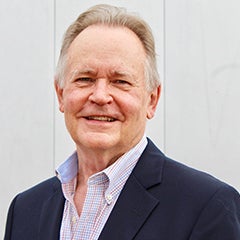
James Rush
Professor, School of Historical, Philosophical and Religious Studies
“I discovered reading for pleasure as a boy. Someone gave me ‘The Yearling,’ a thick, black book with a beautiful cover. My parents subscribed to Reader’s Digest Condensed Books. I read them. I found Mark Twain and was transported to the world of Huck. Brilliant teachers in high school led me to poems like Amy Lowell’s ‘Patterns’ and Frost’s ‘The Death of the Hired Man’ that I still reread today. The folk-song wave and Broadway LPs playing in the living room made me aware of lyrics and I discovered the deep joy of words and music together. I thought, if only I could write songs. For most of my life though, novels have been my greatest armchair pleasure and window into the worlds of others. That is why, as a historian of Southeast Asia, I am drawn to writers as subjects and why students in my history classes must always read literature. In the Vietnamese novel, ‘The Tale of Kieu,’ as rendered poetically into English by Huynh Sanh Thong, one can immerse oneself in an entire civilization of moral values, family relations, art and high and low society while also being swept along by an epic tale of love, loss and redemption and lifted by beautiful words. I am transported. I hope my students are transported. This is how we can live in worlds larger than our own. This is surely what drew me to reading stories as a boy.”
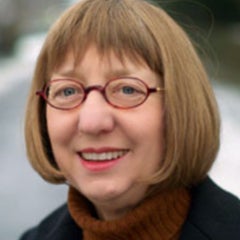
Corine Schleif
Affiliate faculty, professor, Center for the Study of Religion and Conflict
“The ‘aha’ moment for me in the humanities has come very recently – during the current pandemic. It has been within the context of teaching on Zoom. I bring medieval and Renaissance art to my students in their dorm rooms, kitchens and on park benches. They share their images and their research. ... The humanities are a safe place where we can think critically and observe discerningly. It all comes together in the intimacy of our Zoom room. We are mesmerized by the power of Albrecht Durer who takes possession of us through his piercing gaze. We shudder at brilliant paintings of female martyrs brutally tortured. We are curious about the carved monsters inhabiting the edges of the world, that populate monastic dormitories. Claude Levi Strauss arrives to remind us not to be judgmental of cultural others: The barbarian is first and foremost the person who believes in barbarism. James Baldwin and Angela Davis warn us: If they come for you in the morning they are coming for us at night. And we can be inspired to action by Dolores Huerta: Sí se puede!”
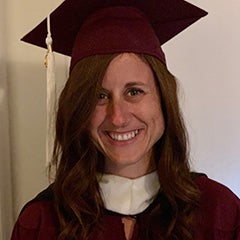
Lindsey Stillman
Master’s degree in World War II studies, Class of 2020
“I gradually fell in love with humanities beginning in elementary school. The reason for this is I have been very fortunate to have inspirational teachers that increased my interest in history, from my fifth grade teacher Bill Cass's president's project to the energetic lectures of my AP European History teacher Eloise Bennett to Professor Philip Ethington's insightful lectures while I attended USC. Their passion led me to not only become a history teacher myself, but to go on to obtain my master's in World War II studies from ASU. And my journey did not stop there, as now due to that experience I am working with the Phoenix Holocaust Association researching Holocaust education mandates. Over time, I have learned not only the importance of history, but how significant educators are in inspiring a love for the humanities.”
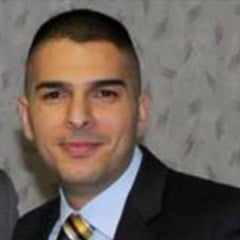
Umar Sulayman
Instructor, School of International Letters and Cultures
“I am from Baghdad. I grew up with a stutter for which I was bullied all my school years. … In college I found myself majoring in English, and in my American English class, I came across Edgar Allan Poe. I saw myself as the Iraqi Edgar Allan Poe who lost his mom at an early age — I lost my mom at age 11 — and struggled to find himself. His poem ‘Alone’ is the one that really affected me back then, in fact, still brings tears to my eyes when I read it. In my linguistics classes, I learned a lot about sounds and the anatomy of speech. I grew out of stuttering, I graduated with honors and began teaching English. I earned my first master’s degree in linguistics and I started teaching Iraqis how to speak English. In 2005, I was kidnapped by militias for teaching people English. … Many English teachers and translators were killed or accused of teaching people English to make them spies for the U.S. Army. I survived and in 2006, I received a Fulbright scholarship and I did my second master’s degree in TESOL in Indiana.”
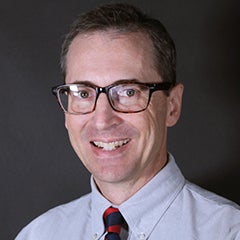
Michael Tueller
Professor, School of International Letters and Cultures
“Like a lot of people, I fell in love with the humanities in college. Growing up in Utah, I was never even aware of the existence of the field that I now teach in. When I got to college, I was an astrophysics major, which was a great outlet for my interests in math, physics and computer science. While I never stopped loving those things, during my sophomore year I began to feel like I needed something else. I knew that I had enjoyed some stories about the ancient Greeks in high school, so I decided just to try the classics, and see if it worked for me. Within a few years, I had learned Latin and Greek, and I fell in love with the way those languages were constructed, which was so different from what I had learned as an English speaker.”
Top image by Jody Lu/The College of Liberal Arts and Sciences.
More Arts, humanities and education

March Mammal Madness hypes science, storytelling in the classroom and beyond
In classrooms throughout the country, the buzz around March Mammal Madness starts long before the tournament begins. For middle school science teacher Jessica Harris, students wonder which…

Different ways of thinking, different ways of thriving: How ASU is supporting students with autism
According to the CDC, over 5.4 million adults in the U.S. are living with autism spectrum disorder, a condition that affects how individuals interact with others, learn and process information.…

Forever sewn in history
The historical significance of Black influence on fashion spans centuries. From the prints and styles of Africa to various American political climates, Black fashion has sealed its impact on the…
